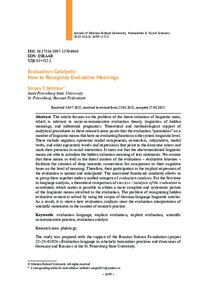Катализаторы оценки: как распознать оценочные смыслы
Скачать файл:
URI (для ссылок/цитирований):
https://elib.sfu-kras.ru/handle/2311/148786Автор:
Нефедов, С. Т.
Nefedov, Sergey T.
Дата:
2022-11Журнал:
Журнал Сибирского федерального университета. Гуманитарные науки. Journal of Siberian Federal University. Humanities & Social Sciences; 2022 15 (11)Аннотация:
В статье фокусируется проблема латентной оценочности языковых
выражений, имеющая важное значение для социокоммуникативной теории
оценки, лингвистики скрытых смыслов, инференциальной прагматики. Теоретико-методологическая
опора процедур анализа на данные исследовательские
направления позволяет установить, что оценка «паразитирует» на целом ряде
языковых средств, которые исходно в системно-языковом
плане не имеют
оценочной функции. К числу таких средств относятся, например, отрицание,
модально-эпистемические
компоненты, коннекторы, конъюнктив, модальные
глаголы, другие эгоцентрические слова и выражения, соотнесенные с субъектом
дискурса и маркирующие его присутствие в социальной интеракции. Показано,
что все они в употреблении способны актуализировать скрытую оценочность
текстовых высказываний. При этом мы исходим из того, что данные средства,
так же как и непосредственные носители оценочных значений – оценочные
лексемы, обнаруживают в своих речемыслительных основаниях на уровне
значения глубинные семантические связи со сравнением. Поэтому их
включенность в имплицитное выражение оценки закономерна. Выявленное
сходство в функционировании позволяет объединить их в отдельной категории
катализаторов оценки. Впервые в лингвистическом анализе конституируется
теоретическая оппозиция носители / катализаторы оценки, позволяющая
получить более полную и системную картину вовлеченных в оценку языковых
средств. Научная задача распознания скрытых оценочных смыслов решается
на материале корпуса немецкоязычных лингвистических статей. В результате
показано, как в контекстах научно-исследовательской
практики катализаторы
оценки направляют оценочную интерпретацию научных утверждений The article focuses on the problem of the latent valuation of linguistic units, which is relevant to socio-communicative evaluation theory, linguistics of hidden meanings, and inferential pragmatics. Theoretical and methodological support of analytical procedures in these research areas posits that the evaluation “parasitizes” on a number of linguistic means that have no evaluating function on the system-linguistic level. These include negation, epistemic modal components, connectors, subjunctive, modal verbs, and other egocentric words and expressions that point to the discourse actors and mark their presence in social interaction. It turns out that the abovementioned linguistic means are able to actualize the hidden valuation meaning of text statements. We assume that these means as well as the direct carriers of the evaluation – evaluative lexemes – facilitate the creation of deep semantic connections for comparison in their cognitive bases on the level of meaning. Therefore, their participation in the implicit expression of the evaluation is natural and anticipated. The uncovered functional similarity allows us to group them together under a unified category of evaluation catalysts. For the first time in language analysis, a theoretical comparison of carriers / catalysts of the evaluation is constituted, which makes it possible to obtain a more complete and systematic picture of the linguistic means involved in the evaluation. The problem of recognizing hidden evaluative content is solved by using the corpus of German-language linguistic articles. As a result, it is shown how evaluation catalysts steer the evaluation interpretation of scientific statements in the context of research practice
Коллекции:
Метаданные:
Показать полную информациюСвязанные материалы
Показаны похожие ресурсы по названию, автору или тематике.
-
Upgrading the Evaluation System of Local Government Performance Efficiency
Pochekutova, Elena N.; Bukharova, Evgenia B.; Klunduk, Ksenia A.; Почекутова, Е.Н.; Бухарова, Е.Б.; Клундук, К.А. (Сибирский федеральный университет. Siberian Federal University, 2015-11)The paper justifies the selection criteria of the evaluation indicators of local government performance efficiency in order to rank municipalities. It proposes to include the evaluation indicators of the development of ... -
The Indicators System Formation for Quality of Life Evaluation as the Basis for Sustainable Socio-Economic Development of Indigenous Minorities of the North
Bryukhanova, Elena A.; Kobalinskiy, Michael V.; Брюханова, Е.А.; Кобалинский, М.В. (Сибирский федеральный университет. Siberian Federal University., 2014-09)The article provides with the evaluation of the efficiency of the mechanisms of the state support of economical and social development of the indigenous minorities of the North. It summarizes the practice of working out ... -
Repressive Policy of the Soviet State against Clerisy of the National Regions in Eastern Siberia in Evaluations of Modern Historiography
Dankina, Nadezhda A.; Данькина, Н.A. (Сибирский федеральный университет. Siberian Federal University., 2014-11)Modern evaluations of the reasons for regional clerisy mass repressions and specific features of political “cleansings” in state institutions and public organizations in the 1920-s – early 1930-s are represented in the ... -
Criteria and Indicators for Evaluating the Efficiency of the State Regional Youth Policy
Dvinskiy, Mikhail B.; Pochekutova, Elena N.; Двинский, М.Б.; Почекутова, Е.Н. (Сибирский федеральный университет. Siberian Federal University, 2015-11)The article discusses the principles of developing criteria and indicators to evaluate the efficiency of the state youth policy at the level of the region of the Russian Federation. Groups of quality and quantity criteria ... -
Approaches to the Impact Evaluation of Territorial Management Mechanisms on the Change of Asymmetry in Socio-Economic Development, Life Quality and Economic Security in the Resource Regions of the Country
Bukharova, Evgenia B.; Samusenko, Svetlana A.; Semionova, Anna R.; Vitkovskaia, Ludmila K.; Бухарова, Е.Б.; Самусенко, С.А.; Семенова, А.Р.; Витковская, Л.К. (Сибирский федеральный университет. Siberian Federal University., 2016-11)The article describes methodological aspects of the analysis of asymmetry in the modern socioeconomic state of the resource regions in the Russian Federation as the result of historicallyshaped distribution of the ...

